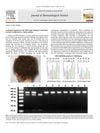 29 citations,
June 2017 in “Journal of Inherited Metabolic Disease”
29 citations,
June 2017 in “Journal of Inherited Metabolic Disease” High-content screening is useful for finding new treatments for rare diseases and has led to FDA-approved drugs.
 26 citations,
May 2021 in “International Journal of Molecular Sciences”
26 citations,
May 2021 in “International Journal of Molecular Sciences” Cheonggukjang may help prevent and manage various diseases and improve overall health, but its odor and safety concerns need addressing.
[object Object]  23 citations,
October 2006 in “Journal of Investigative Dermatology”
23 citations,
October 2006 in “Journal of Investigative Dermatology” Men with baldness have higher levels of specific proteins, suggesting local hormone production may play a role in hair loss.
 20 citations,
July 2015 in “Journal der Deutschen Dermatologischen Gesellschaft”
20 citations,
July 2015 in “Journal der Deutschen Dermatologischen Gesellschaft” Green tea may help with skin health and protect against UV damage, but more research is needed to confirm its safety and effectiveness.
 18 citations,
October 2014 in “Experimental Dermatology”
18 citations,
October 2014 in “Experimental Dermatology” Local skin glucocorticoid production is crucial for healthy skin, and its disruption can lead to skin diseases.
 16 citations,
July 2012 in “Current pharmaceutical biotechnology”
16 citations,
July 2012 in “Current pharmaceutical biotechnology” New treatments for skin conditions related to the sebaceous gland are being developed based on current research.
 15 citations,
July 2013 in “Cell Reports”
15 citations,
July 2013 in “Cell Reports” Indian Hedgehog helps control skin cell growth and protects against aggressive skin cancer.
 13 citations,
November 2009 in “Journal of Dermatological Science”
13 citations,
November 2009 in “Journal of Dermatological Science” A gene mutation causes woolly hair in a Syrian patient.
 12 citations,
December 2017 in “Food and chemical toxicology”
12 citations,
December 2017 in “Food and chemical toxicology” Permanent hair dye mixtures can irritate and damage the skin.
 10 citations,
January 2016 in “Dermatology”
10 citations,
January 2016 in “Dermatology” Psoriasis lesions have fewer and smaller oil glands, which might affect the condition's development.
 10 citations,
October 2015 in “Medicina Clínica (english Edition)”
10 citations,
October 2015 in “Medicina Clínica (english Edition)” Recombinant human epidermal growth factor is versatile, effective, and safe for long-term skin and mucosal treatments.
 10 citations,
July 2011 in “Springer eBooks”
10 citations,
July 2011 in “Springer eBooks” Carboxytherapy can improve skin conditions with few side effects, but results may vary and are not guaranteed.
 10 citations,
March 2007 in “Dermatology”
10 citations,
March 2007 in “Dermatology” Sex-determining genes may affect male baldness.
 9 citations,
January 2019 in “Postepy Dermatologii I Alergologii”
9 citations,
January 2019 in “Postepy Dermatologii I Alergologii” The skin acts like an endocrine organ, making hormones that affect skin diseases and respond to stress.
 6 citations,
April 2013 in “Journal of Investigative Dermatology”
6 citations,
April 2013 in “Journal of Investigative Dermatology” Spironolactone might lower the chance of getting rosacea.
 5 citations,
February 2011 in “Expert Opinion on Drug Discovery”
5 citations,
February 2011 in “Expert Opinion on Drug Discovery” We need better treatments for hair loss, and while test-tube methods are helpful, they can't fully replace animal tests for evaluating new hair growth treatments.
 4 citations,
June 2021 in “Dermatology”
4 citations,
June 2021 in “Dermatology” Scientists created a 3D skin model to study a chronic skin disease and test treatments.
 3 citations,
January 2008 in “Endocrine journal”
3 citations,
January 2008 in “Endocrine journal” A new mutation linked to partial Androgen Insensitivity Syndrome and prostate cancer was found in a patient unhappy with their female gender assignment.
[object Object]  2 citations,
June 2023 in “Journal of cell science”
2 citations,
June 2023 in “Journal of cell science” Mutations in iRhom2 affect hair and skin in mice and are linked to esophageal cancer, with ADAM17 playing a crucial role.
 2 citations,
January 2019 in “Medizinische Genetik”
2 citations,
January 2019 in “Medizinische Genetik” The document reports findings on genetic research, including ethical concerns about genome editing, improved diagnosis of mitochondrial mutations, solving inherited eye diseases, confirming gene roles in epilepsy, linking a gene to aneurysms, and identifying genes associated with age-related macular degeneration.
 1 citations,
July 2018 in “Elsevier eBooks”
1 citations,
July 2018 in “Elsevier eBooks” Heredity and hormones cause common hair loss, and topical minoxidil is the first recommended treatment.
 October 2023 in “Biomedical science and engineering”
October 2023 in “Biomedical science and engineering” Innovative methods are reducing animal testing and improving biomedical research.
 November 2022 in “CARDIOMETRY”
November 2022 in “CARDIOMETRY” A group has developed therapies that show promise for treating cancer and various other conditions.
 January 2020 in “Elsevier eBooks”
January 2020 in “Elsevier eBooks” Plant-based chemicals may help hair growth and prevent hair loss but need more research to compete with current treatments.
 December 2018 in “IntechOpen eBooks”
December 2018 in “IntechOpen eBooks” Neurohormones help control skin health and could treat skin disorders.
 December 2013 in “Biomedical and biopharmaceutical research”
December 2013 in “Biomedical and biopharmaceutical research” Nanotechnology shows promise for better drug delivery and cancer treatment.
 April 2010 in “The Journal of Urology”
April 2010 in “The Journal of Urology” The research found that androgens help control blood flow in the rat prostate through a specific binding site.
466 citations,
June 2009 in “Experimental dermatology” We now understand more about what causes acne and this could lead to better, more personalized treatments.
 August 2023 in “Drug Design Development and Therapy”
August 2023 in “Drug Design Development and Therapy” Minoxidil may work for hair loss by reducing androgen sensitivity and altering hormone-related enzymes.
137 citations,
January 2006 in “Frontiers in bioscience” CRH in the skin acts like the body's stress response system, affecting cell behavior and immune activity.




























